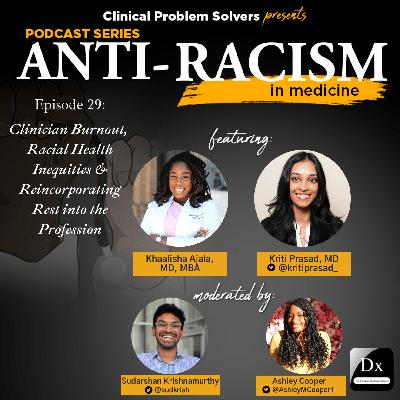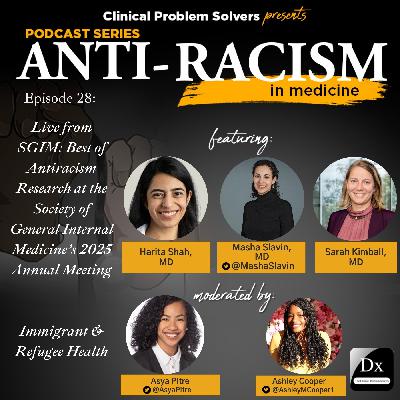Episode 392: Antiracism in Medicine – Episode 27 – Racial and Gender Health Disparities in Youth Suicide: Part 2
Description

CPSolvers: Anti-Racism in Medicine Series
Episode 27 – Racial and Gender Health Disparities in Youth Suicide: Part 2
Show Notes by Asya Pitre
April 25, 2025
Summary: In this second half of a two-part series, Dr. Tami Benton and Dr. Kevin Simon discuss racial and gender health disparities in youth suicide. They explore the impact of racism, trauma, and inequities in care, while emphasizing the need for culturally grounded, community-based prevention. The episode highlights the importance of policy advocacy, culturally responsive therapy, and practicing cultural humility in mental health care.
Episode Learning Objectives
After listening to this episode, learners will be able to:
- Identify barriers and facilitators to establishing care with a child and adolescent psychiatrist
- Explain the shifting visibility of racial and gender health disparities in the academic literature
- Describe the importance of cultural humility and racial concordance in health care
Credits
- Written and produced by: Ashley Cooper, Sudarshan Krishnamurthy, and Team
- Host: Ashley Cooper
- Infographic and Audio Edits: Ashley Cooper
- Show Notes: Asya Pitre
- Guests: Dr. Tami Benton and Dr. Kevin Simon
Speaker Biographies
Dr. Tami Benton, MD, is the Frederick Allen Professor of Psychiatry at the University of Pennsylvania. She is the Psychiatrist-in-Chief and Chair of the Department of Child and Adolescent Psychiatry and Behavioral Sciences at the Children’s Hospital of Philadelphia (CHOP). She is the President of The American Association of Directors of Child and Adolescent Psychiatry (AADCAP) and the President of The American Academy of Child and Adolescent Psychiatry (AACAP). She served on the National Institute of Mental Health Advisory Council and the APA’s Council for Research. Dr. Benton mentors clinical and research physicians, fellows, and postdoctoral trainees. She was awarded the Society of Biological Psychiatry Humanitarian Award and the Community Outreach Award by the American Foundation for Suicide Prevention. Dr. Benton’s career has been dedicated to developing leadership for a diverse child psychiatry workforce. Her mission — preparing the next generation of diverse physician leaders in pediatric healthcare and mental health and creating partnerships between communities and academic centers — will be critical for eliminating disparities among minority populations.
Dr. Kevin M. Simon, MD, MPH, is Boston’s inaugural Chief Behavioral Health Officer, appointed by Mayor Michelle Wu. He is a physician-scientist, health policy expert, inspirational teacher, and a gifted writer. Dr. Simon is a pediatric addiction medicine psychiatrist at Boston Children’s Hospital; an assistant professor in psychiatry at Harvard Medical School; a recent Commonwealth Fund fellow in health policy at Harvard University; and the medical director of Wayside Youth & Family Support Network. Clinically, he cares for youth and families through the Department of Psychiatry & Behavioral Sciences and the new Division of Addiction Medicine at Boston Children’s Hospital. Academically, he has won multiple awards for research on structural violence, health equity, and mental health. Additionally, he consults with federal agencies on mental health system design and practices. Dr. Simon’s writings on health equity are in notable journals like the American Journal of Public Health and the New England Journal of Medicine. National audiences regularly seek his perspectives on mental health through trusted outlets.
Episode Takeaways
- Rising Suicide Rates Among Black and Indigenous Girls: In this episode of the Clinical Problem Solvers Anti-Racism in Medicine Podcast, host Ashley Cooper is joined by Dr. Tami Benton and Dr. Kevin Simon to continue the conversation on racial and gender health disparities in youth suicide. The episode opens with a discussion on the rising suicide rates among Black girls. Dr. Simon stresses the importance of educational efforts to dismantle biases and calls for greater research attention to this group. Dr. Benton emphasizes the role of intersecting psychosocial factors—poverty, racism, and trauma—that contribute to suicide risk among Black and Indigenous girls and how these early life experiences impact mental health in adulthood.
- Community-Based Prevention: The conversation then moves toward community-based prevention, with Dr. Simon advocating for trusted community networks to support youth mental health. He points out that historically, some community spaces have also been sources of harm, so intentional engagement and mental health education are essential. Dr. Benton’s presidential theme, as President of the American Academy of Child and Adolescent Psychiatry, “Bringing the Village to the Children,” underscores the importance of collective responsibility. She highlights promising initiatives like suicide prevention programs in African American churches and the American Foundation for Suicide Prevention-Soul Shop.
- Dr. Simon’s Role as Chief Behavioral Health Officer: Dr. Simon shares his work as Boston’s first Chief Behavioral Health Officer, prioritizing substance use treatment and uplifting Black and Indigenous communities. The episode also explores how digital tools can help youth manage their mental health, while also noting the need for culturally relevant care providers.
- Disparities in Restraint Practices: Disparities in restraint practices are addressed, particularly the disproportionate use of physical and pharmacologic restraints on Black people.
- Policy issues such as the need for enforcement of the Mental Health Parity and Equity Act (MHPAEA) are discussed, alongside practical clinical strategies to prevent youth suicide. These include population-specific adaptations of DBT, attachment-based family therapy, and increasing research on effective interventions for minority youth. A referenced meta-analysis questions the effectiveness of psychotherapy in communities with high levels of anti-Black racism, reinforcing the importance of environmental context in mental health outcomes.
- The Mental Health Parity and Addiction Equity Act (MHPAEA) and Youth Suicide Interventions: Racial socialization is offered as a protective intervention for youth facing racism-related trauma.
- Key Takeaways (Awareness, Access, and Cultural Humility): The conversation ends by emphasizing awareness of mental health warning signs in youth, advocating for broader access to care, and














